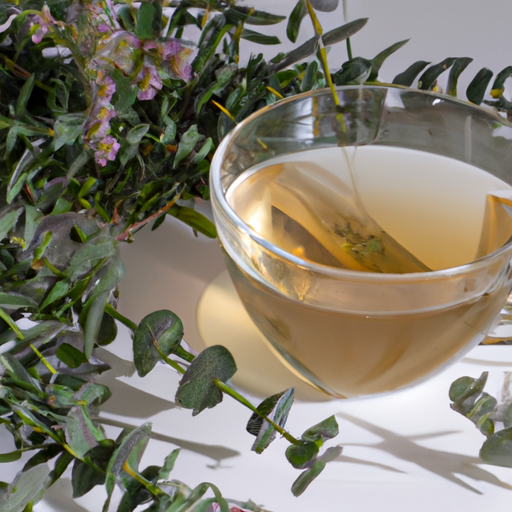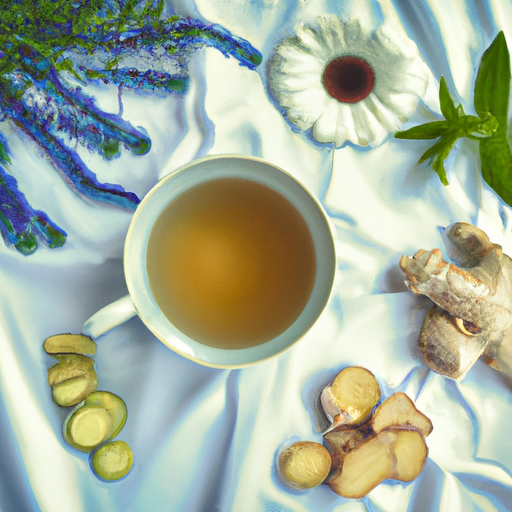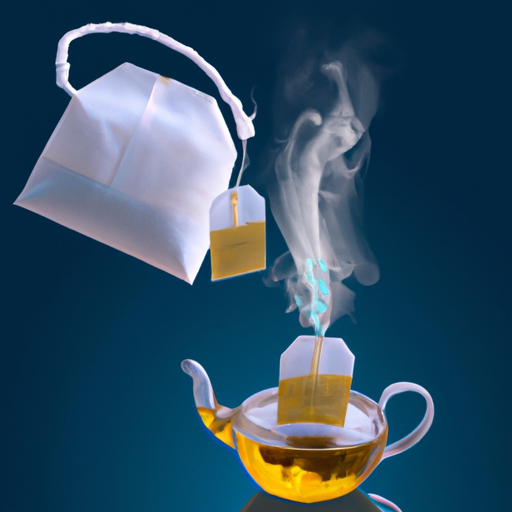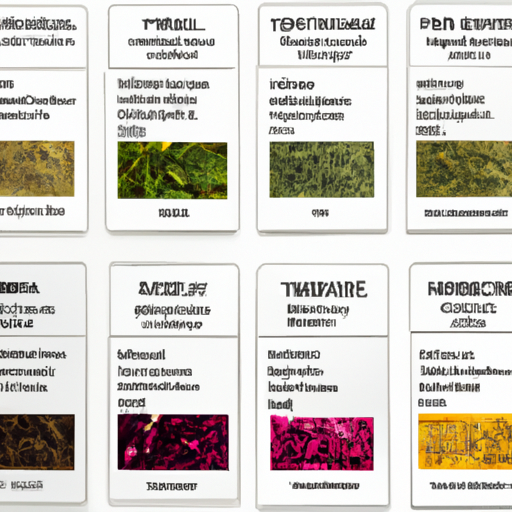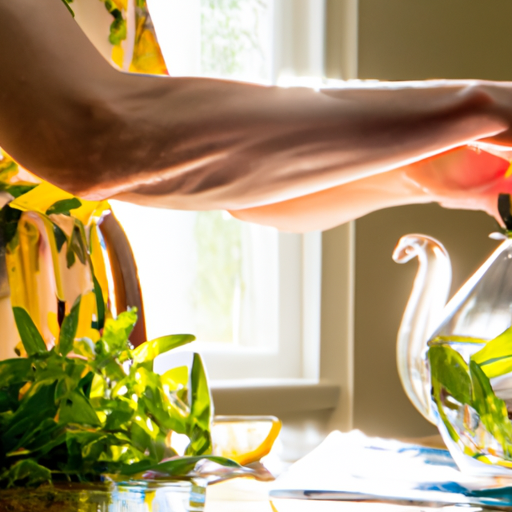Are you tired of the discomfort in your chest when you’re congested? I certainly am. But don’t worry, because I have the solution you’ve been eagerly anticipating.
In this article, I will reveal the herbal teas that can help relieve a congested chest. These teas have been tried and tested, and they are backed by scientific evidence.
First up, we have peppermint tea. With its cooling properties, peppermint tea can help soothe your chest and ease congestion.
Next, we have eucalyptus tea, known for its powerful decongestant effects. This tea can effectively clear your airways and provide instant relief.
If you prefer a spicier option, ginger tea is the way to go. Ginger has anti-inflammatory properties that can reduce chest congestion and promote better breathing.
Another great option is chamomile tea, which not only helps relax your body but also has mild expectorant properties.
For those looking for a more potent remedy, thyme tea is a fantastic choice. Thyme is known to be a natural expectorant that can help break up mucus and ease chest congestion.
Additionally, licorice root tea can provide soothing relief to a congested chest.
Last but not least, a classic combination of lemon and honey tea can work wonders for your congested chest. The lemon helps to thin mucus while the honey soothes your throat and provides antimicrobial effects.
So, if you’re tired of feeling weighed down by chest congestion, stay tuned as we dive deeper into the benefits of these herbal teas. Relief is just a sip away!
Key Takeaways
- Peppermint tea has cooling properties, acts as a natural decongestant, and has anti-inflammatory properties, making it effective in relieving a congested chest.
- Eucalyptus tea provides instant relief, clears airways, and reduces chest congestion due to its decongestant effects.
- Ginger tea offers antioxidant benefits, reduces chest congestion, and promotes better breathing by combating inflammation.
- Thyme tea acts as a natural expectorant, breaks up mucus, and boosts the immune system, making it effective in easing chest congestion.
Peppermint Tea
If you’re feeling the weight of congestion on your chest, peppermint tea is here to provide you with soothing relief. Peppermint tea isn’t just delicious, but it also offers numerous health benefits that can help clear up your congestion. The menthol in peppermint acts as a natural decongestant, helping to break up mucus and relieve chest congestion. Additionally, peppermint tea has anti-inflammatory properties that can reduce swelling in your airways and ease breathing.
To make peppermint tea at home, simply steep a handful of fresh peppermint leaves in hot water for about 5-10 minutes. You can also add a squeeze of lemon or a teaspoon of honey for added flavor. With its refreshing taste and therapeutic properties, peppermint tea is a great natural remedy for a congested chest.
Now, let’s move on to the next herbal tea, eucalyptus tea, for even more relief.
Eucalyptus Tea
To clear up your stuffy chest, try sipping on some eucalyptus brew. Eucalyptus tea is a soothing herbal remedy known for its ability to relieve congestion and promote respiratory health. Made from the leaves of the eucalyptus tree, this tea contains eucalyptus oil, which has numerous benefits for the respiratory system.
The powerful aroma of eucalyptus oil can help to open up the airways, making it easier to breathe and reducing chest congestion. To make eucalyptus tea, simply steep a few eucalyptus leaves in hot water for about 5-10 minutes. You can also add a touch of honey or lemon for added flavor.
With its natural decongestant properties, eucalyptus tea is a great choice for relieving a congested chest.
Next, let’s dive into the benefits of ginger tea.
Ginger Tea
Get ready to invigorate your senses with a piping hot cup of ginger tea, a delicious and revitalizing beverage that’ll leave you feeling refreshed and rejuvenated.
Ginger tea isn’t just a soothing remedy for a congested chest, but it also offers a range of antioxidant benefits. The active compounds in ginger, like gingerol and zingerone, possess powerful antioxidant properties that help combat inflammation and protect the body against oxidative stress.
To make ginger tea, simply steep fresh ginger slices or grated ginger in boiling water for about 10 minutes. You can add a squeeze of lemon or a teaspoon of honey to enhance the flavor.
As we move on to the next section about chamomile tea, you’ll discover another herbal tea that can provide relief for a congested chest.
Chamomile Tea
Prepare to unwind and relax with a steaming cup of chamomile tea, a delightful and calming beverage that’ll soothe your senses.
Chamomile tea has numerous benefits that make it a popular choice for relaxation. It’s known for its calming properties, which can help reduce anxiety and promote better sleep.
Chamomile tea contains antioxidants that may help reduce inflammation and protect against certain chronic diseases. It’s also been shown to have mild sedative effects, making it a great choice for those looking to wind down after a long day.
Additionally, chamomile tea has been used for centuries to soothe digestive issues and promote overall digestive health. With its pleasant taste and numerous health benefits, chamomile tea is a perfect choice for those seeking a moment of tranquility.
Now, let’s move on to the next herbal tea, thyme tea.
Thyme Tea
Thyme tea is a wonderful herbal remedy for a congested chest, as it has expectorant properties that help to loosen mucus. The active compounds in thyme, such as thymol and carvacrol, have antiseptic effects that can also help to reduce inflammation and fight off respiratory infections. By drinking thyme tea regularly, you can effectively alleviate congestion and promote easier breathing.
Expectorant Properties
Drinking herbal tea with expectorant properties can help provide relief to a congested chest, making it easier to breathe. Thyme tea, in particular, is known for its expectorant benefits. It contains compounds like thymol and carvacrol, which help to loosen mucus and phlegm in the respiratory system. Thyme tea also has antioxidant benefits, which can help reduce inflammation and boost the immune system.
These natural remedies have been used for centuries to alleviate congestion and promote respiratory health. Additionally, thyme tea has antiseptic effects, which can further support the healing process in the respiratory tract. By incorporating thyme tea into your daily routine, you can take advantage of its expectorant and antiseptic properties, providing relief and supporting your overall respiratory health.
Antiseptic Effects
Experience the healing power of thyme tea as it works its magic, soothing and purifying your respiratory system with its incredible antiseptic effects. Thyme is well-known for its antibacterial properties, making it an excellent natural remedy for a congested chest. Here are four reasons why thyme tea is a must-try:
-
Antibacterial properties: Thyme contains compounds like thymol, which’ve been shown to exhibit strong antibacterial effects. These properties help fight off any harmful bacteria in the respiratory system, reducing inflammation and congestion.
-
Respiratory health: Thyme tea helps to cleanse and purify the respiratory system, promoting overall respiratory health. It can help alleviate symptoms of chest congestion and provide relief from coughing and wheezing.
-
Immune system support: The antiseptic effects of thyme tea can boost the immune system, helping the body fight off infections and prevent further complications.
-
Natural remedy: Thyme tea is a safe and natural alternative to over-the-counter medications. It provides relief without the side effects often associated with pharmaceutical drugs.
By incorporating thyme tea into your routine, you can experience its antiseptic effects and enjoy relief from chest congestion. This natural remedy also helps loosen mucus, promoting easier breathing and overall respiratory comfort.
Helps Loosen Mucus
Moving on to our current subtopic, let’s explore how herbal teas can help loosen mucus and provide relief from a congested chest. Natural remedies for chest congestion have been used for centuries, and herbal teas are known for their numerous benefits for respiratory health. These teas contain compounds that have expectorant properties, helping to break up and expel mucus from the respiratory tract. Additionally, they can soothe irritated airways and reduce inflammation, providing further relief. To help you understand the benefits of herbal teas for respiratory health, let’s take a look at the following table:
| Herbal Tea | Benefits | Active Compounds |
|---|---|---|
| Peppermint | Relieves congestion | Menthol |
| Eucalyptus | Clears airways | Eucalyptol |
| Ginger | Reduces inflammation | Gingerols and shogaols |
| Thyme | Loosens mucus | Thymol, carvacrol, flavonoids |
| Chamomile | Soothes irritated | Chamazulene |
Now that we have explored the benefits of herbal teas, let’s delve into the next section about licorice root tea.
Licorice Root Tea
To find relief for your congested chest, try sipping on a cup of Licorice Root Tea – it’s like a soothing balm for your respiratory system. Licorice root, derived from the Glycyrrhiza plant, has been used for centuries in traditional medicine for its numerous health benefits.
Studies have shown that licorice root contains compounds with expectorant properties, making it effective in helping to loosen mucus and alleviate chest congestion. It can also help reduce inflammation in the respiratory tract, providing further relief. However, it’s important to note that licorice root should be consumed in moderation, as excessive intake can lead to side effects such as high blood pressure and low potassium levels.
Now, let’s explore another natural remedy for a congested chest – lemon and honey tea.
Lemon and Honey Tea
When you’re feeling under the weather, there’s nothing quite like a warm cup of lemon and honey tea to soothe your respiratory system. Lemon and honey have long been used for their medicinal properties, and they can be especially beneficial in relieving chest congestion.
Lemon is packed with vitamin C, which helps boost the immune system and reduce inflammation in the respiratory tract. Honey, on the other hand, has antibacterial properties that can help fight off infections.
To make the perfect cup of lemon and honey tea, start by boiling water and adding freshly squeezed lemon juice. Then, stir in a spoonful of honey until it dissolves. Sip on this comforting concoction throughout the day to help relieve your congested chest and promote healing.
Frequently Asked Questions
Can herbal teas completely cure a congested chest?
Herbal teas can provide relief for a congested chest, but they may not completely cure it. It’s important to consider herbal tea alternatives and be aware of any potential long-term effects.
How often should I drink herbal tea to relieve chest congestion?
To relieve chest congestion, I recommend drinking herbal tea multiple times throughout the day. When choosing the right herbal tea, look for ingredients like eucalyptus or ginger. The best time to drink herbal tea for chest congestion is in the morning and before bed.
Are there any side effects or potential risks associated with drinking these herbal teas?
There may be potential interactions and long-term effects associated with drinking herbal teas. It is important to consult with a healthcare professional before consuming them to ensure safety and minimize any risks.
Can pregnant women or individuals with certain medical conditions drink these herbal teas?
Pregnant women should consult their healthcare provider before consuming herbal teas. Similarly, individuals with certain medical conditions should exercise caution and seek medical advice regarding any potential restrictions or limitations.
Can herbal teas be combined or mixed together to enhance their effectiveness in relieving chest congestion?
Mixing different herbal teas can enhance their effectiveness in relieving chest congestion. Combining herbs like eucalyptus, peppermint, and ginger can provide a synergistic effect, helping to alleviate symptoms and promote respiratory health.
Conclusion
As I conclude my exploration of herbal teas for relieving a congested chest, I can’t help but think of a beautiful garden. Just as each plant in a garden has its own unique beauty and purpose, each herbal tea I discussed serves a specific function.
Whether it’s the refreshing and invigorating qualities of peppermint or the soothing and calming effects of chamomile, these teas can offer relief and comfort when you need it most. So next time you find yourself with a congested chest, why not take a sip from nature’s garden and let these herbal teas work their magic?

